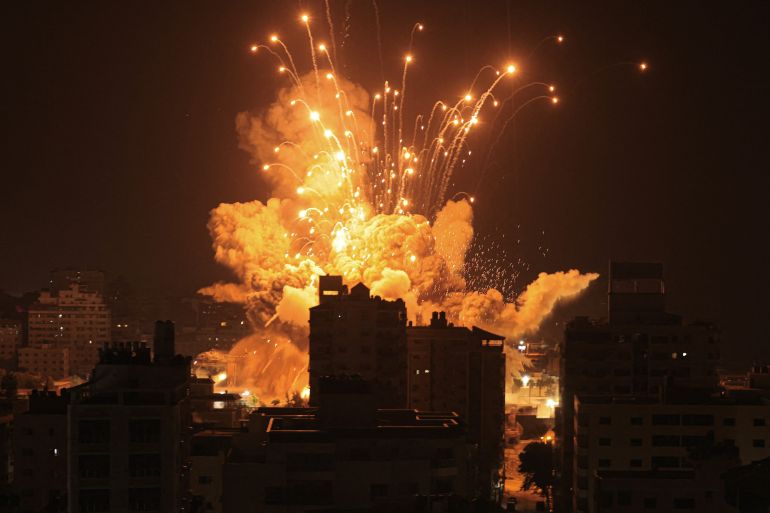UN Security Council meets on Gaza-Israel, but fails to agree on statement
US pushes for harsh condemnation of Hamas but fails to achieve the consensus necessary for a statement.

The United Nations Security Council (UNSC) has met behind closed doors in an emergency session amid the war between Israel and Gaza but failed to achieve the unanimity needed for a joint statement.
At least 1,100 people have already been killed since Hamas, the Palestinian group that controls the blockaded Gaza Strip, launched an assault on Israeli towns on Saturday and took hundreds of people hostage.
Keep reading
list of 4 itemsThe Take: The shockwaves of the Hamas assault on Israel
‘Where do we go?’: Gaza residents as Israel declares war, bombs homes
Tel Aviv’s residents start venturing out
Israel retaliated by declaring a state of war and pounding densely-populated Gaza, killing hundreds of people.
The United States called on the council’s 15 members to strongly condemn Hamas.
“There are a good number of countries that condemned the Hamas attacks. They’re obviously not all,” senior US diplomat Robert Wood told reporters after the session.
“You could probably figure out one of them without me saying anything,” said Wood, in a reference to Russia, whose relations with the West have deteriorated sharply since its invasion of Ukraine.
The council met for about 90 minutes and heard a briefing from the UN Middle East peace envoy Tor Wennesland.
Diplomats said members led by Russia were hoping for a broader focus than condemning Hamas.
A statement needs to be agreed upon by consensus.
“My message was to stop the fighting immediately and to go to a ceasefire and to meaningful negotiations, which was told for decades” by the Security Council, said Vassily Nebenzia, Russia’s UN ambassador.
“This is partly the result of unresolved issues,” he said.
The United Arab Emirates, which normalised relations with Israel as part of a landmark 2020 deal, said it expected more UNSC meetings on the crisis.
“I think everyone understands that today, the situation is one of grave concern,” said the UAE Ambassador Lana Zaki Nusseibeh.
“Many members of the Council believe that a political horizon leading to a two-state solution is the only way to finally solve this conflict,” she said.
‘Path to peace’
Neither Israel nor the Palestinian Authority (PA), based in the West Bank and a political rival to Hamas, attended the meeting because they are currently on the Security Council.
The Palestinian Ambassador Riyad Mansour called on diplomats to focus on ending the Israeli occupation.
“Regrettably, history for some media and politicians starts when Israelis are killed,” he said.
“This is not a time to let Israel double down on its terrible choices. This is a time to tell Israel it needs to change course, that there is a path to peace where neither Palestinians nor Israelis are killed.”
In an open letter sent to UNSC members ahead of the meeting, three Palestinian human rights organisations said the UN’s inaction had enabled the latest violence and meant its members were “complicit” in what had happened.
The Palestine-based organisations – Al-Haq, Al-Mezan Centre for Human Rights and the Palestinian Centre for Human Rights – called on UN member states to address the “root causes and protect the Palestinian people from Israeli attacks”.
Meanwhile, ahead of the meeting, Israel’s UN Ambassador Gilad Erdan showed graphic pictures of Israeli civilians being taken captive by Hamas.
“These are war crimes – blatant, documented war crimes,” Erdan told reporters.
“This unimaginable, unimaginable atrocity must be condemned. Israel must be given steadfast support to defend ourselves – to defend the free world.”
Home to some 2 million people and measuring about 365sq km (141sq miles), the Gaza Strip has been ruled by Hamas since 2007 since a brief war with forces loyal to the PA.
Its assault in Israel coincides with US-backed moves to nudge Saudi Arabia towards normalising ties with Israel in return for a defence deal between Washington and Riyadh.
“We don’t see any reason that should be off the table,” said Erdan. “We still want it to happen. We’ll do everything that we can to live in co-existence with all of our neighbours.”